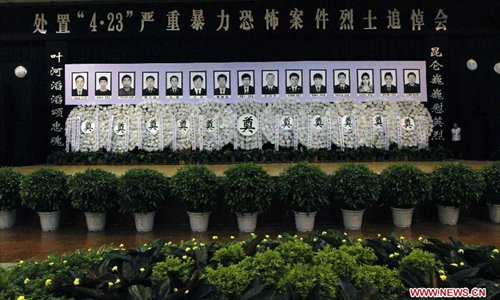Xinjiang terrorism may take another turn

One week after the Boston marathon bombings, a violent clash with terrorists took place in Bachu county, Kashgar Prefecture, in Northwest China's Xinjiang Uyghur Autonomous Region, leaving 15 police and social workers dead, three of whom were women.
This incident is likely to have an important impact on Xinjiang's stability.
Previously, violent attacks in Xinjiang usually stemmed from the clashes between the Han people and the Uyghurs, and the Han rather than the Uyghur were the major victims. Therefore, ordinary Uyghurs often feel violent terrorism has nothing to do with themselves.
However, the clashes this time were different. The terrorists, when resorting to violent means, didn't differentiate by religion, ethnicity, or gender. Most of the dead were Uyghurs.
The Uyghur community has felt the threat from terrorism for the first time and begun to understand the harm brought by such attacks. They are becoming disillusioned with the rhetoric of ethnic interests spouted by some Uyghurs in the face of bloody realities.
This may help stir condemnation against violent attacks from the Uyghur community, which could contribute to maintaining local stability and anti-terrorist efforts.
At the same time, the latest violence shows the current anti-terrorist measures and those for maintaining stability still lack a strategic approach and sustainability.
It is usually the case that when a violent attack occurs, all forces become tense, with police patrolling around and community workers checking every home. After a few months, these forces get lax until there is another violent case, and another round of patrolling and checking resumes. Patrolling has not become systemized.
The Bachu incident also reflects the severe social conflicts within Xinjiang. In recent years, Xinjiang has achieved substantial progress in terms of economic development, the social insurance system and people's livelihoods. However, the social conflicts in Xinjiang remain complicated.
While the policies made by local authorities are mainly to improve the economy, they are still inadequate in fully and timely responding to the political demands of ethnic groups. Social conflicts have been accumulating rather than being resolved.
The Bachu incident has aroused international attention, and external observers mainly cast doubt on whether this violent attack was really terrorism.
The nature of terrorist attacks in China is not very different with that in Western countries. They are, cruelly and inhumanely, targeted randomly at innocent civilians.
What's different is that the terrorist attacks in Western countries can be traced to external input, while those in Xinjiang have shown a tendency to come from inside.
Besides, the education of China's terrorists is generally low, and the tools they resort to are primitive and low-end. The media expose that terrorists used a pressure cooker as part of a bomb in Boston may be imitated by China's terrorists in the future.
There have been terrorist activities in Xinjiang, but so far there hasn't been enough evidence to show a concrete terrorist organization exists.
A terrorist organization needs an explicit political doctrine, leading figures and a set of organizational bodies to raise funds, train its staff, purchase arms and support logistics. Judging from this, there is no terrorist organization in Xinjiang.
The terrorist activities are committed mainly under the influence of terrorist thought and partly because of dissatisfaction with local governments and the Han people.
In the long run, violent terrorism is likely to take place in Xinjiang again, and a terrorist organization in the real sense may emerge. But terrorism is preventable and its head can be lowered. It depends on whether we conduct solid work.
The author is an associate research fellow of the Sociology Institute with the Xinjiang Academy of Social Sciences. opinion@globaltimes.com.cn